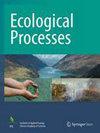气候变暖对温带草原土壤真菌群落及其功能的影响
IF 3.9
2区 环境科学与生态学
Q1 ECOLOGY
引用次数: 0
摘要
全球变暖对土壤真菌群落及其功能的潜在影响仍不确定。为了解决这个问题,我们研究了 3 年模拟野外气候变暖对中国北方内蒙古温带大草原真菌群落及其功能的影响。通过高通量测序测量了真菌群落的多样性和结构。通过与 ITS 参考数据库进行比较,确定了真菌群落的功能。结果表明,气候变暖并不影响真菌的多样性,但显著增加了真菌群落的复杂性,真菌类群之间的联系更加紧密。我们观察到,植物病原菌和丛枝菌根真菌是最丰富的功能群。同时,气候变暖显著降低了动物病原体的相对丰度。气候变暖明显增加了真菌群落的复杂性,而土壤酸碱度是影响土壤真菌功能的主要因素。我们的研究结果表明,真菌群落及其功能群对气候变暖的反应对生态系统的生物地球化学循环具有重要影响。本文章由计算机程序翻译,如有差异,请以英文原文为准。
Effects of warming on soil fungal community and its function in a temperate steppe
The potential effects of global warming on soil fungal communities and their functions remain uncertain. To address this issue, we investigated the effects of 3-year simulated field warming on the community and function of fungi in a temperate steppe of Inner Mongolia, northern China. The diversity and structure of the fungal community were measured by high-throughput sequencing. The functionality of fungal communities was identified by comparison with the ITS reference database. Our results showed that warming did not affect the diversity of fungi, but significantly increased the complexity of the fungal community, with fungal taxa more closely associating with each other. We observed that plant pathogens and arbuscular mycorrhizal fungi were the most abundant functional groups. Meanwhile, warming significantly decreased the relative abundance of animal pathogens. Warming significantly increased the complexity of the fungal community, with soil pH being the main factor affecting soil fungal function. Our findings emphasize that the response of the fungal community and its functional groups to warming has significant implications for ecosystem biogeochemical cycling.
求助全文
通过发布文献求助,成功后即可免费获取论文全文。
去求助
来源期刊

Ecological Processes
Environmental Science-Ecological Modeling
CiteScore
8.50
自引率
4.20%
发文量
64
审稿时长
13 weeks
期刊介绍:
Ecological Processes is an international, peer-reviewed, open access journal devoted to quality publications in ecological studies with a focus on the underlying processes responsible for the dynamics and functions of ecological systems at multiple spatial and temporal scales. The journal welcomes manuscripts on techniques, approaches, concepts, models, reviews, syntheses, short communications and applied research for advancing our knowledge and capability toward sustainability of ecosystems and the environment. Integrations of ecological and socio-economic processes are strongly encouraged.
 求助内容:
求助内容: 应助结果提醒方式:
应助结果提醒方式:


